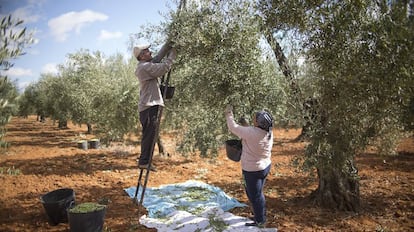After imposing heavy tariffs, US sends “men in black” to check Spain’s olive trade
Spanish producers fear that they may have to exit the American market, after Trump administration slaps 17% tariff on produce


An investigation into unfair competition that the US government launched last summer into Spanish black-olive producers continues this week, with a visit from a group United States Department of Commerce inspectors to verify the information that Spanish companies have been supplying over recent months.
The trip by the so-called “men in black,” which starts this week in Brussels and Madrid and will continue next week in Seville, comes two weeks after the Donald Trump administration imposed a new provisional tariff on these companies – a tax that, according to the businesses themselves, is making it “impossible” to continue in the market.
In November, the US imposed a tariff of 4.47%, raising it to 17.13% at the end of January
The “disproportionate aggressiveness” of the investigation has rattled the sector, which exported 32 million kilograms of black olives to the US market in 2016, to the value of €70 million. In November, the US decided to impose an average tariff of 4.47% on the produce, raising it to 17.13% at the end of January.
“The sector cannot stand, on average, 22% taxes,” explains the general secretary of the Spanish Association of Exporters and Industry of Table Olives (ASEMESA), Antonio de Mora.
The visit of the inspectors is within the usual procedures for this kind of investigation, and seeks to ensure that there are no discrepancies between the reports that have been sent to the US by the local administrations and companies, according to sources from the sector. Over recent months, the producers have had to supply information to the US Department of Commerce about public subsidies they receive as well as about the companies themselves. “Should they see that the information does not match up, they can alter the tariffs they are applying,” explains De Mora.
The first phase of the verification will focus on subsidies, and then in March, on alleged disloyal competition. The US government opened the inspection in July on the suspicion that the Spanish producers were benefiting from allegedly unfair assistance that allows them to sell their produce below the market price.
Producers say that the tariffs are making it “impossible” to continue in the US market
“While the damage will be felt gradually, the sector will have no choice but to begin to leave the market over the coming months,” De Mora explains. “There are contracts that have already been lost due to the uncertainty and many are companies that, right now, are negotiating with their buyers to see how they can deal with the situation.”
“There are contracts that we have lost to Morocco, clients that have cut their orders and others that are waiting for us to close a trade deal between now and March,” explains Gabriel Redondo, the chairman of olive exporter Agro Sevilla, whose business in the US represents 20% of its total production. “Exiting the market would mean restructuring our production chain,” adds Redondo, who has been selling to some of his US clients for 18 years. “It’s all very painful,” he adds.
Both De Mora and Redondo have called on the Spanish central and local governments to do more. “It’s not enough for them to say in a Cabinet meeting that they’re disappointed about the situation,” says De Mora. “We know that, but what are we going to do about it?” He suggests that the European Union could “use the same weapons” as Trump and open investigations into American products. “The US has started a trade war against Europe and they have used us as scapegoats,” Redondo claims.
There are contracts that we have lost to Morocco, clients that have cut their orders and others that are waiting for us to close a trade deal
Gabriel Redondo, Chairman of olive exporter Agro Sevilla
Both the Andalusian regional government and the central Agriculture Ministry say that they are working to defend the interests of the sector. “Everyone can see that this is a warning shot and that they are going after more products, although they have started with the three most competitive Andalusian companies in the sector,” said the Andalusian regional premier, Susana Díaz, last week during a trip to Brussels. “The European Commissioner for Trade, Cecilia Malmström, has shown great sensitivity with this problem, and there is complete coordination with the European Union and the Spanish government to mitigate the damage,” the politician added.
English version by Simon Hunter.
Tu suscripción se está usando en otro dispositivo
¿Quieres añadir otro usuario a tu suscripción?
Si continúas leyendo en este dispositivo, no se podrá leer en el otro.
FlechaTu suscripción se está usando en otro dispositivo y solo puedes acceder a EL PAÍS desde un dispositivo a la vez.
Si quieres compartir tu cuenta, cambia tu suscripción a la modalidad Premium, así podrás añadir otro usuario. Cada uno accederá con su propia cuenta de email, lo que os permitirá personalizar vuestra experiencia en EL PAÍS.
¿Tienes una suscripción de empresa? Accede aquí para contratar más cuentas.
En el caso de no saber quién está usando tu cuenta, te recomendamos cambiar tu contraseña aquí.
Si decides continuar compartiendo tu cuenta, este mensaje se mostrará en tu dispositivo y en el de la otra persona que está usando tu cuenta de forma indefinida, afectando a tu experiencia de lectura. Puedes consultar aquí los términos y condiciones de la suscripción digital.








































